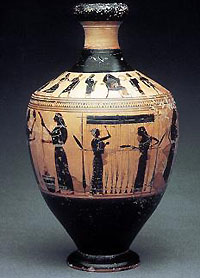2005 Summer Reading
The Burial at Thebes
Family
by Prof. Leslie Mechem, Classics
Oikos means house, household, or family. Forming the basic unit of Greek life, the oikos consisted of parents and children as well other relatives and slaves. When a child was born into a Greek oikos the father could accept it as his own or reject it if he doubted its parenthood, or if it were sickly, or if he did not want another child. If he rejected the child, he placed it at a crossroads or on the town garbage heap, a practice called infanticide - for it amounted to condemning the infant to death. The Greeks did not perceive this as murder, because they assumed that someone might eventually discover the baby and rescue it. This happened most famously to Oedipus when shepherds rescued him from certain death after his parents had rejected him at birth (see the essay on Mythology). An accepted child came into the oikos and its father and mother nurtured it and educated it to progress through the various stages of life. The Greeks considered children to be rather like wild animals until they reached puberty and became adults but children always owed their parents respect and obedience; a father’s word was law in his oikos.
Boys in well-off homes received an education, first from their fathers and then at school; those in poor households learned their father’s trade. Girls, supervised by their mothers, focused on learning how to cook, clean, and manage the slaves. Both types of education were critical for training children to become citizens who would continue the oikos and through it support the success of the polis. The Greeks valued both male and female roles, which were heavily gendered, and viewed them as necessary components of a correctly functioning polis.

Typical genre scene: Black-figure vase
with women working at a loom, by the
Amasis Painter, ca. 540 BCE
(Skidmore Visual Resources)
At puberty, probably around 13-15 years of age, girls married and entered a new oikos while boys, who married when older, tended to remain in their paternal oikos until they chose a bride and began their own oikos. The wife, together with the mother of her husband or other leading female in his family's home, ran the inner workings of the household. She oversaw the cleaning, cooking, and manufacture of clothing, and surpervised the slaves of the house. In other words, she controlled the oikonomia of the oikos, which means literally the "proper management of the household" and what we now term "economics." For most Greeks, particularly those in Athens, the best wife was a woman who performed these duties efficiently but whose name was never spoken, in a sense not even known, by those outside her oikos. In this way, others could not possibly gossip about her, but instead see her as a source of praise for her husband. Her husband concerned himself with the outside world, particularly his civic duties as a citizen. This entailed participating in the political life of his polis, visiting the gymnasium, and managing his assets whether in or outside the city.
Since girls married at a relatively young age it is difficult to tell what kind of relationships siblings maintained once they left their original oikos. Gatherings of related oikoi occurred where, presumably, brothers and sisters would meet and visit. Once the father of the oikos died, adult brothers had the responsibility of caring for any unmarried sisters still in the oikos. Whether most siblings saw each other on a regular basis is unclear. Brothers must have met frequently since they operated in the outside world of the polis. Unless sisters lived quite close to each other it is less likely that they congregated very often. In The Burial at Thebes, Antigone and Ismene are part of the oikos of their uncle Creon and so are in daily contact. Soon they should both marry and, although Antigone will remain in Thebes as Haemon’s wife, Ismene likely will marry outside this oikos and thus, will leave it.